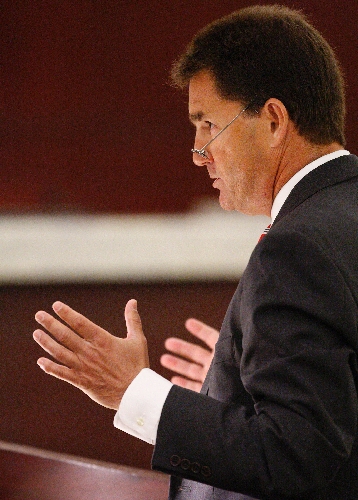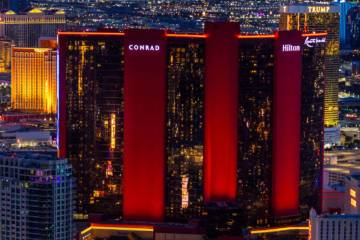Supreme Court hears arguments in O.J. Simpson appeal
In what could be O.J. Simpson's last chance at freedom, his lawyer asked the Nevada Supreme Court on Friday to overturn the fallen football star's convictions on armed robbery and kidnapping charges and grant a new trial.
"With the trial judge's help, we believe this case was not a search for the truth, but a search for redemption," Yale Galanter told Justices Michael Cherry, Nancy Saitta and Mark Gibbons.
The hearing came 13 months after Simpson, 62, and co-defendant Clarence "C.J." Stewart, 56, appealed their convictions to the high court based on what they say were a variety of trial errors by District Judge Jackie Glass.
Glass sentenced both men to prison after their October 2008 convictions on kidnapping, armed robbery and other charges in connection with the 2007 hotel room holdup of two sports memorabilia dealers at Palace Station.
A key issue in Simpson's appeal was the dismissal of the only two black potential jurors in the final stages of jury selection.
Galanter argued that both women were removed by prosecutors because of the color of their skin.
"They knew that if African-American jurors were on this panel, that the likelihood of conviction decreased," Galanter said.
District Attorney David Roger, who led the Simpson prosecution team, said the dismissals had nothing to do with race.
One juror was dismissed because of her strong feelings that her brother had been wrongfully convicted of child abuse, he said. She also was in a prison ministry and had written in her juror questionnaire that she wouldn't send anyone to jail, Roger said.
The other woman said she was a fifth-grade teacher who should be with her class. The next day she produced a chiropractor's note saying she couldn't sit or stand for long periods, which indicated she didn't want to be on the jury, Roger said.
Simpson also appealed Glass' denial of a jury instruction regarding intent and the armed robbery charge. Simpson's lawyers had argued at the trial that he was simply recovering what he thought was his own property when he went to the hotel room.
"In Nevada, you can't use robbery to claim your own property," Gibbons noted.
Galanter agreed but said a robbery conviction still requires criminal intent, and that wasn't explained to the jury.
"You still have to have criminal intent. You still have to have an evil mind," Galanter said.
He also argued that Simpson never should have been charged with kidnapping because any holding of the victims in the hotel room happened during the robbery.
But Roger argued that the kidnapping occurred well before the confrontation in the room.
In the days before the holdup, Simpson and others planned the meeting in recorded conversations that touched on how to avoid surveillance cameras and ensure they surprised the memorabilia dealers.
"Their plan was to lure these victims to a hotel room," Roger said. "Their intent was to get the jump on these individuals."
The high court also heard oral arguments from Brent Bryson, Stewart's lawyer.
His biggest issue, one raised throughout the four-week trial, was that his client could never get a fair trial sitting next to Simpson.
"This whole trial was a make-up trial for O.J. Simpson's acquittal in California, and Mr. Stewart got caught up in it," Bryson said.
Roger countered that argument by pointing out that Stewart took part in the planning of the confrontation, set up Simpson's meeting with one of the gunmen and even frisked the two victims in the hotel room.
"This wasn't mere presence," Roger said. "He was actively involved in this conspiracy."
Bryson further argued that sitting next to Simpson was like having a "big monkey" on his back that was impossible to escape.
Saitta questioned this position, saying that even if Stewart had his own trial, there was no way to avoid bringing up Simpson's involvement.
"He's there whether he's there physically or not," she said.
Stewart's defense team disagreed with Simpson's lawyers on the use of key audio recordings that captured the hotel room confrontation and meetings before and after.
Bryson challenged the authenticity of the recordings, noting that even FBI experts couldn't guarantee that no one had tampered with them. But Simpson's lawyers allowed the recordings into evidence without any fight, Bryson said.
Both Bryson and Galanter contended that Glass treated them differently from prosecutors, which prejudiced them in front of the jury.
"You can't treat one side as a professional and one side as a child," Bryson said.
Galanter noted that as he made an argument at one point in the trial, Glass' bailiff stood behind him with handcuffs, creating the image to the jury that he was doing something wrong.
"That mental picture is devastating to me," he said.
The Supreme Court will consider the written and oral arguments before issuing a ruling on the appeals.
Meanwhile, Simpson continues serving a nine- to 33-year prison sentence at Lovelock Correctional Center, a medium-security facility about 90 miles northeast of Reno.
Stewart, who received a slightly shorter sentence, is serving time at Northern Nevada Correctional Center in Carson City.
Contact reporter Brian Haynes at bhaynes@reviewjournal.com or 702-383-0281.

















